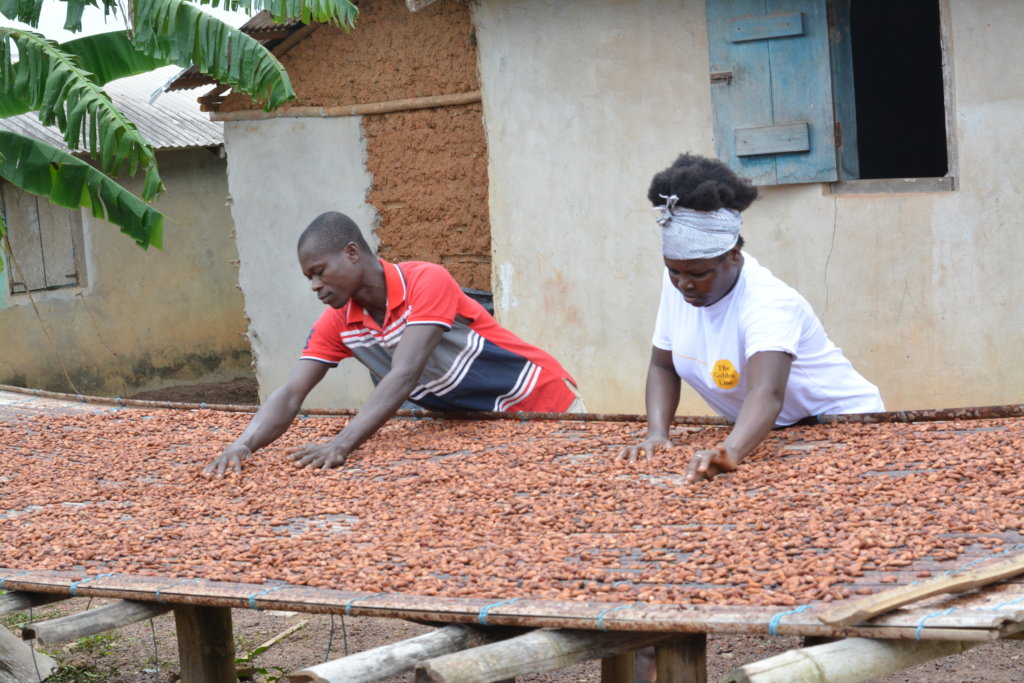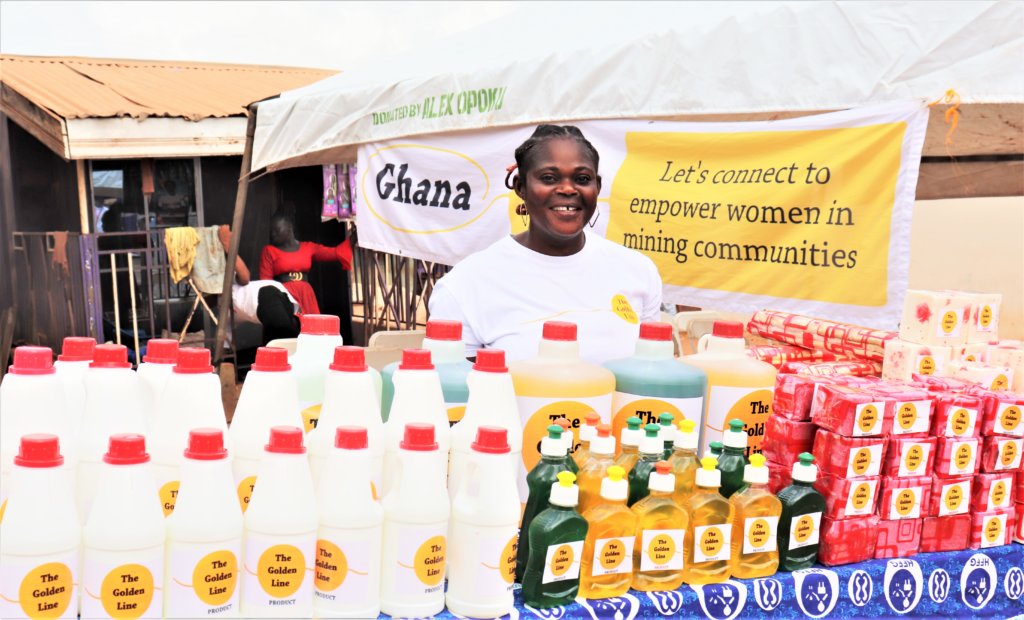The Golden Line project creates capital for women’s businesses and an enabling environment for their psychosocial wellbeing.
The Village Savings and Loans Association (VSLA) for Women in Mining Communities under the Golden Line Programme has yielded GHC120, 650.00 from July to December, 2019 and GHC 202,500.00 from January to July, 2020.
Four hundred and nine (409) women in 8 programme communities benefited from loans at an interest rate of 10% in 2019 and part of 2020 under Phase B of the 5- year intervention. The intervention seeks to create an enabling/supportive environment to empower women in and around artisanal and small-scale gold mining communities in the Western Region of Ghana, to improve their opportunities to engage in economic activities, decision making and sexual reproductive health and rights.
Women in mining communities face a multitude of challenges in sustaining their livelihoods, ranging from skills, access to market, alternative livelihoods and opportunities for growth. Hope for Future Generations (HFFG) as one of the local implementing NGOs representing Simavi on the Golden Line Programme, in 2019, supported Twenty-Six (26) Village Savings & Loans Associations (VSLAs) in 8 programme communities to mobilize funds through savings in the form of share purchase into a loan fund. As a result, the groups gave out loans of One hundred & Twenty thousand, six hundred & fifty Ghana Cedis (GHC120,650.00) to one hundred & seventy-two (172) women.

In 2020 from January to July, the same VSLA mobilized two hundred and two thousand, five hundred Ghana Cedis (GHC202,500.00) and gave out as loans to two hundred and thirty-seven (237) women from their Associations for income generation activities at an interest rate of 10%. These sum up to a total of three hundred and twenty-three thousand, one hundred and fifty Ghana Cedis (GHC323, 150.00) from their savings given out as loans to members.
Out of this money, one hundred and seventy-four thousand, four hundred and sixty-three Ghana Cedis, 15 pesewas (GHC174,463.15) was shared out to one hundred and eighty-four (184) women according to their savings at the end of 1 year. It is interesting to know that Fifty-three (53) women from two (2) Village Savings and Loans Associations under Phase A groups also shared out one hundred and twenty thousand, four hundred and twenty-five (GHC120,425.00).
As a result of the Golden Line Programme, some women have started new businesses like provision/grocery shops, local chop bars, drinking spots, pastries, soap and beads making among others while others have improved on their old businesses. Some Phase A women have built houses ranging from one to four rooms and others have also employed people for skills training and even paid for their skills training through their share-out money at the end of one year.

Periodically, HFFG staff invites the Business Advisory Centre (BAC) Officers of the Municipal/District Assemblies to train and sensitize VSLA women in their communities on business skills, alternative sources of income and what the BAC does to support people, especially women. This also created links between BAC and VSLA women for continuous mutual benefit. As a result of the linkage, BAC provided VSLA women with information on opportunities to access matching funds from Amenfiman and Fiaseman Rural Banks. The individual pays 40% of the value and receive 60% as grant by BAC under National Board for Small Scale Industries (NBSSI).
Gender and SRHR under the Golden Line project
The Golden Line Programme is working on household financial planning, Sexual and Reproductive Health and Rights (SRHR), the value of women in the household, gender equality, the management of stressful situations and the effects of gender based violence on women’s wellbeing. In view of this, VSLA women and their partners were taken through 8 weeks gender discussion series which led participants through a process in which they reflected on their own experiences, attitudes and behaviours in order to create conditions for women to make decisions about the household, and their own SRH, while remaining free from violence within their own homes. This has resulted in partners now planning together for their families and women’s contribution in the homes has been acknowledged by men.

Male Involvement in SRHR
HFFG staff also trained eight (8) males as agents to support women interventions in communities under engaging men in accountable practice (EMAP) with the aim of eradicating violence against women and girls. The 8 males are acting as Male Ambassadors/Allies of the programme in the communities to prevent violence against women and girls. At the community level, groups (both male and female groups) were taken through 8 weeks activities for women and 16 weeks activities for men. EMAP took participants through activities that reduce harmful behaviours and increase gender equality in the home. It also gives men the tools and knowledge to rethink of belief systems and prevent violence against women and girls, use the voices of women in the community and provide women with opportunities to reflect on violence in their lives and communities. According to women and men in Golden Line Programme communities, EMAP has resulted in a reduction in violence in the homes.
Effective Health Care Delivery
The programme team again trained the VSLA women and health workers on social accountability for effective and efficient health care delivery in 8 programme communities. After the training, both the women and health workers assessed health service delivery in health facilities through the use of scorecards. After the scoring, impediments in health service delivery were identified. Some issues that could be solved were handled at the community level through dialogue sessions and those above community level were referred to key stakeholders. In view of this, a multi-stakeholder validation/dialogue meeting was organized on the outcome of score cards analysis for networking and improved health care service, especially SRHR. The stakeholders said they were happy with Golden Line activities and would make sure that issues of concern will be worked on to improve health service delivery as expected.